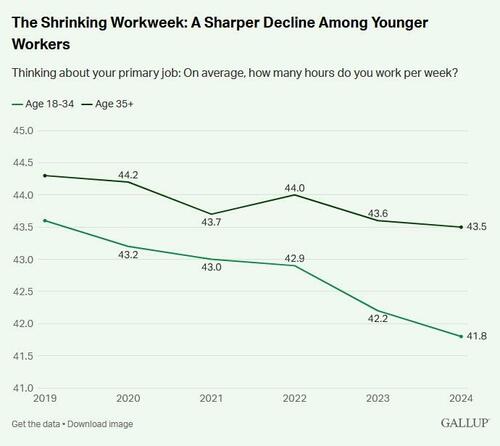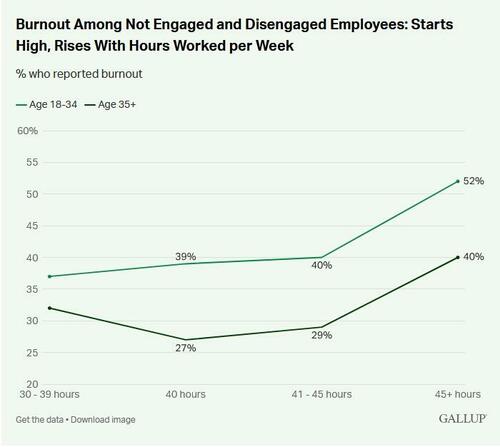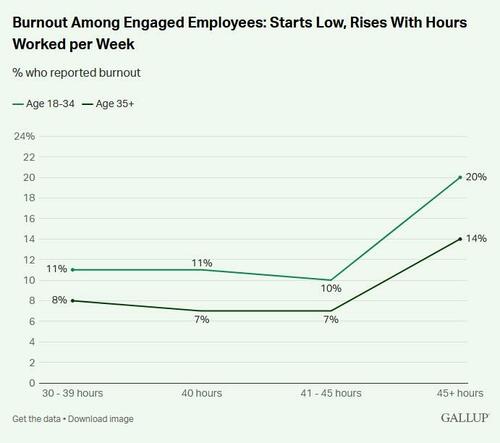Why Americans Are Working Less
By Jim Harter of Gallup
Full-time employees in the U.S. have been working fewer hours per week for the past five years. What are the implications for employees and their organizations? And what’s driving the trend?
Gallup finds that average hours worked have dropped progressively since 2019 when U.S. employees reported working an average of 44.1 hours. In 2024, they work 42.9 hours per week.
The decline in hours worked is more pronounced among younger (those younger than 35) than older workers (those aged 35 and older). Between 2019 and 2024, older employees have seen an average reduction of just under one hour per person per week, while younger employees have reduced their hours by nearly two hours.
Over a year, that’s the equivalent of older employees taking an extra week off of work and younger employees taking two weeks. These trends apply to full-time employees working at least 30 hours per week.
Possible Reasons for the Drop in Average Hours Worked per Week
Several new findings may explain this shift:
- Overall employee wellbeing has been on the decline.
- Employees now have less trust in institutions in general and feel more detached from their employers.
- After a decade of steady improvement, employee engagement has reverted to its 2014 level.
- Advances in technology may be making work more efficient. Gallup finds that nearly half (45%) of employees say AI has helped them improve their productivity. However, a workforce that is becoming more technically efficient and less engaged may lack the motivation needed for long-term growth.
- Employees — especially younger ones — now place a higher priority on their overall wellbeing. In fact, work-life balance and better overall wellbeing now rank among the most important considerations when choosing a new job.
Additionally, data from the Bureau of Labor Statistics (BLS) shows declines in overall hours worked per person, particularly in industries that traditionally employ more young workers such as retail, leisure and hospitality.
The Connection Between Hours Worked and Employee Burnout
Burnout may be a major reason why employees are working fewer hours. The World Health Organization (WHO) has classified “burnout” as a work-related syndrome resulting from chronic stress.
Previous Gallup research has found that an unmanageable workload is one of the contributing factors to burnout. This may help explain why employees report higher burnout (very often or always) as the number of hours they work rises above 45 hours per week.
Leaders and managers should view signs of burnout as a red flag. Employees who say that they feel burned out very often or always are:
- 32% less likely to say they feel great responsibility for the quality of products/services their organization offers customers
- 58% less likely to say their coworkers always do what is right for customers
- 56% less likely to say their organization always delivers on the promise they make to customers
- 74% more likely to be looking for another job
In short, burned-out employees are unmotivated to serve customers and perform below their potential.
Gallup finds that the overall work environment strongly influences burnout risk. Employees of all ages who work 45 or more hours per week — and are either not engaged or actively disengaged — are at a greater risk of burnout. Younger workers are especially vulnerable, with more than half of those who are disengaged reporting that they often or always feel burned out.
Engaged employees, however, report much less burnout. About one in 10 engaged younger workers and even fewer older engaged employees report burnout very often or always when working less than 45 hours per week.
Although the burnout rate doubles for engaged employees working 45 or more hours per week, 80% of younger workers and 86% of older workers report that they rarely or never feel burned out, even when working 45 or more hours per week.
Burnout Isn’t Just About Hours — It’s About Management
As Gallup has found in previous research, burnout is driven by much more than just hours worked. Other major causes include being treated unfairly at work, receiving unclear communication from managers, lack of manager support and experiencing unreasonable time pressure. These are all influenced by how employees are managed.
Organizations that focus too narrowly on hours worked — and develop a one-size-fits-all “hours worked” policy — risk missing the mark. Gallup data show that employees of different ages have varying preferences regarding work hours. Some thrive on a steady 9-to-5 schedule, while others prefer a more flexible approach that blends work and personal life. Some may choose to work extra hours to complete a meaningful project or simply because it is their way of excelling at work.
For managers, the key is staying closely connected to each employee, ideally weekly. This helps them support high performance by aligning work with employees’ strengths and accommodating each person’s unique work-life needs.
Tyler Durden Wed, 03/26/2025 – 07:45
Source: https://freedombunker.com/2025/03/26/why-americans-are-working-less/
Anyone can join.
Anyone can contribute.
Anyone can become informed about their world.
"United We Stand" Click Here To Create Your Personal Citizen Journalist Account Today, Be Sure To Invite Your Friends.
Before It’s News® is a community of individuals who report on what’s going on around them, from all around the world. Anyone can join. Anyone can contribute. Anyone can become informed about their world. "United We Stand" Click Here To Create Your Personal Citizen Journalist Account Today, Be Sure To Invite Your Friends.
LION'S MANE PRODUCT
Try Our Lion’s Mane WHOLE MIND Nootropic Blend 60 Capsules
Mushrooms are having a moment. One fabulous fungus in particular, lion’s mane, may help improve memory, depression and anxiety symptoms. They are also an excellent source of nutrients that show promise as a therapy for dementia, and other neurodegenerative diseases. If you’re living with anxiety or depression, you may be curious about all the therapy options out there — including the natural ones.Our Lion’s Mane WHOLE MIND Nootropic Blend has been formulated to utilize the potency of Lion’s mane but also include the benefits of four other Highly Beneficial Mushrooms. Synergistically, they work together to Build your health through improving cognitive function and immunity regardless of your age. Our Nootropic not only improves your Cognitive Function and Activates your Immune System, but it benefits growth of Essential Gut Flora, further enhancing your Vitality.
Our Formula includes: Lion’s Mane Mushrooms which Increase Brain Power through nerve growth, lessen anxiety, reduce depression, and improve concentration. Its an excellent adaptogen, promotes sleep and improves immunity. Shiitake Mushrooms which Fight cancer cells and infectious disease, boost the immune system, promotes brain function, and serves as a source of B vitamins. Maitake Mushrooms which regulate blood sugar levels of diabetics, reduce hypertension and boosts the immune system. Reishi Mushrooms which Fight inflammation, liver disease, fatigue, tumor growth and cancer. They Improve skin disorders and soothes digestive problems, stomach ulcers and leaky gut syndrome. Chaga Mushrooms which have anti-aging effects, boost immune function, improve stamina and athletic performance, even act as a natural aphrodisiac, fighting diabetes and improving liver function. Try Our Lion’s Mane WHOLE MIND Nootropic Blend 60 Capsules Today. Be 100% Satisfied or Receive a Full Money Back Guarantee. Order Yours Today by Following This Link.










